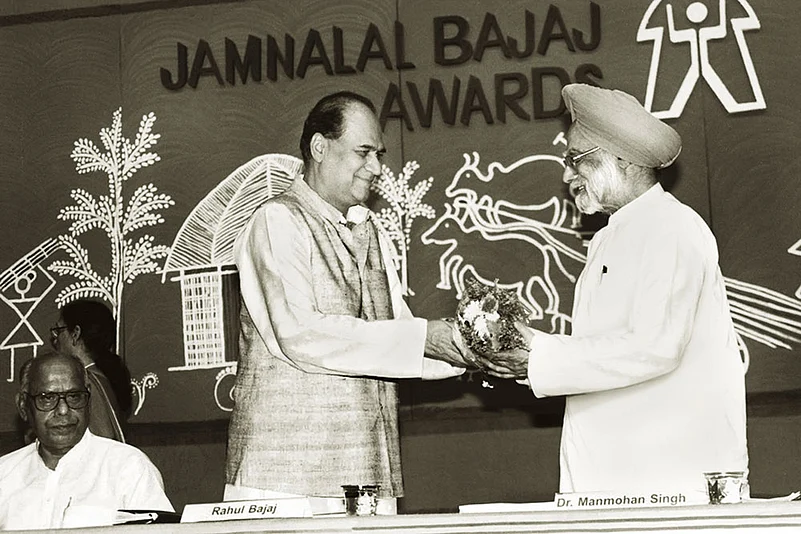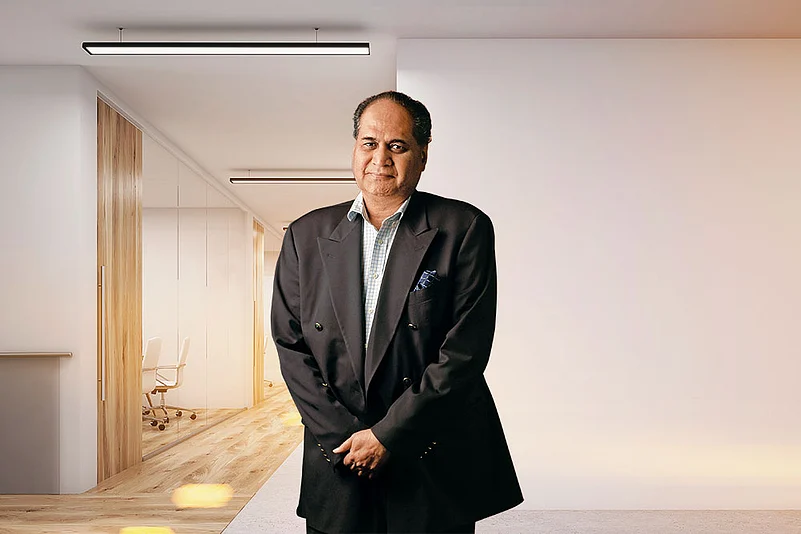Rahul Bajaj was one of the loudest voices in the Indian business sphere that spoke truth to power—be it during his Bombay Club days or raising concerns about the current dispensation’s ability to take criticism. But there is a lot more to Bajaj that gets dwarfed before that bold personality. Walking the readers through the nooks and crannies of his personal and professional lives is author Gita Piramal in her latest book Rahul Bajaj: An Extraordinary Life. Here is an excerpt from the book:
It is a beautiful moment and Bajaj savours it to the full. Giving him company in the front row, sitting on his right is old friend, Adi Godrej, and on his left, Shefali Bajaj. In front of him, on the stage, are Sanjiv, Pamnani and Rajeev Jain. With a beaming smile, Amit Shah confers on the trio one of the biggest honours of corporate India: the Economic Times ‘Company of the Year’ award. The audience, from Mukesh Ambani, Sunil Bharti Mittal and Kumar Mangalam Birla to the Bajaj Finserv team propping up the wall, bursts into applause.
The open house Q & A follows. On stage, chairs are swiftly brought in for Piyush Goyal, Nirmala Sitharaman and Amit Shah. ‘Someone came up to me,’ recalls Bajaj. ‘I was in the front row only because of Sanjiv and Nanoo. “Sir, Bodhisatva Ganguli is asking if you would like to ask a question.” I shook my head, indicating a “no”. But he kept requesting me. From the stage, Piyush spoke directly to me. “Rahul bhai, kuch toh boliye!” I couldn’t now not speak.’
A mic is handed to him. Bajaj stands up. He is a tall man. Everyone can see him. Within seconds, expectations ripple. Bajaj switches frequently between English and Hindi in order to make himself intelligible to the larger audience. He does his best to soften his voice, words and body language, for his messages will be bitter. He has crossed the age of eighty, officially retired, and with no Rupa to restrain him.

Rahul Bajaj with former prime minister Manmohan Singh
To reduce the temperature—or rather, to give notice on what is about to come, Bajaj prefaces his remarks by wryly noting that he was born ‘anti-establishment’ and his concerns as ‘minor things’. Bajaj raises three apprehensions: the ability of the Narendra Modi government to accept criticism, its lack of action against mob lynching; and the glorification of Nathuram Godse, Mahatma Gandhi’s assassin, by the BJP MP Sadhvi Pragya Singh Thakur.
‘Nobody from our industrialist friends will speak, (so) I will say openly,’ begins Bajaj, ‘an environment will have to be created. When the United Progressive Alliance-II was in power, we could criticize anyone. You are doing good work, but despite that we don’t have the confidence that you will appreciate if we criticize you openly. Intolerance is in the air. We don’t see any convictions…’
Referring to Thakur, Bajaj adds, ‘Today anybody can be called a patriot. You know the man who shot Gandhi ji, or is there any doubt about that, I don’t know. No one knew her (Thakur). You gave her the ticket, she won. That’s all right. She won because of your support. Then you brought her into the consultative committee. The prime minister had said that it would be difficult, still you brought her into the consultative committee. (Yet) for this session, this small session, she doesn’t have permission to attend. This is one example.’
In full control of the live situation facing him, Shah responds in Hindi. ‘Several media organizations regularly criticize (Narendra) Modi and the current government, even then, if you say that there is a certain kind of atmosphere, we will have to make efforts to improve the atmosphere. But I would like to say that there is no need for anybody to fear. No one wants to scare, and we have done nothing to be concerned about any criticism. The government is run in the most transparent way, and we have no fear of any opposition, and if anyone does criticize, we will look at the merit of the same and make efforts to improve ourselves.
On incidents of lynching, Shah adds: ‘Lynchings happened earlier too, probably more than now . . . But it is not correct that there have been no convictions. Several cases of lynching have been concluded and there have been punishments, but the media does not publish them. Vineetji is here, if he looks for them and publishes them, it will be good for us.’
On Thakur, the home minister stresses that neither the BJP nor the Centre support any of her statements on Godse and that they condemn them. Adds Shah quickly, that there may have been some confusion over whether the Bhopal legislator had meant Godse or the revolutionary, Udham Singh.
(Excerpted from Rahul Bajaj: An Extraordinary Life by Gita Piramal, published by Penguin Random House India, March 2022)

























